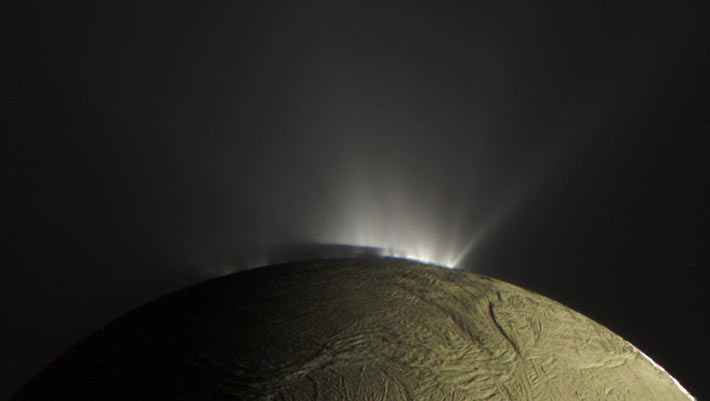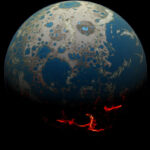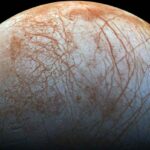Phosphorus has not previously been detected in oceans beyond those on Earth and this discovery provides a promising step forward in our understanding of ocean worlds.
Enceladus, the sixth-biggest moon of Saturn, harbors a global water ocean.
This ocean lies under an ice crust and above a rocky core where tidal dissipation is suspected to drive hydrothermal activity.
There are several lines of evidence describing how volatile and dissolved materials from the rocky core are either emitted by the plume in the gas phase or incorporated into ice particles, respectively.
“We previously found that Enceladus’ ocean is rich in a variety of organic compounds,” said Dr. Frank Postberg, a planetary scientist at Freie Universität Berlin.
“But now, our result reveals the clear chemical signature of substantial amounts of phosphorus salts inside icy particles ejected into space by the small moon’s plume.”
“It’s the first time this essential element has been discovered in an ocean beyond Earth.”

Liquid water erupts from Enceladus’ subsurface ocean, forming a plume that contains grains of frozen ocean water. Some of these ice grains go on to form Saturn’s E ring. Image credit: SwRI / Freie Universität Berlin.
Phosphorus in the form of phosphates is vital for all life on Earth.
It is essential for the creation of DNA and RNA, energy-carrying molecules, cell membranes, bones and teeth in people and animals, and even the sea’s microbiome of plankton.
Life as we know it is simply not possible without phosphates.
“In 2020, we used geochemical modeling to predict that phosphorus should be abundant in Enceladus’ ocean,” said Southwest Research Institute’s Dr. Christopher Glein.
“Now, we have found abundant phosphorus in plume ice samples spraying out of the subsurface ocean.”
In their study, Dr. Postberg, Dr. Glein and their colleagues analyzed mass spectra of E-ring’s ice grains emitted by Enceladus.
The data were collected by the Cosmic Dust Analyzer instrument onboard NASA’s Cassini spacecraft.
The measurements not only detected phosphorus — in the form of orthophosphate ions — but together with laboratory data suggest that phosphorus might be available at concentrations at least 100 times higher than in Earth’s oceans.
“We found phosphate concentrations at least 100 times higher in the moon’s plume-forming ocean waters than in Earth’s oceans,” Dr. Glein said.
“Using a model to predict the presence of phosphate is one thing, but actually finding the evidence for phosphate is incredibly exciting.”
“This is a stunning result for astrobiology and a major step forward in the search for life beyond Earth.”
“By determining such high phosphate concentrations readily available in Enceladus’ ocean, we have now satisfied what is generally considered one of the strictest requirements in establishing whether celestial bodies are habitable,” said Dr. Fabian Klenner, a researcher at the University of Washington.
“The next step is clear — we need to go back to Enceladus to see if the habitable ocean is actually inhabited,” said Dr. Nozair Khawaja, a planetary scientist at Freie Universität Berlin.
The findings were published in the journal Nature.
_____
F. Postberg et al. Detection of phosphates originating from Enceladus’s ocean. Nature 618, 489-493; doi: 10.1038/s41586-023-05987-9




